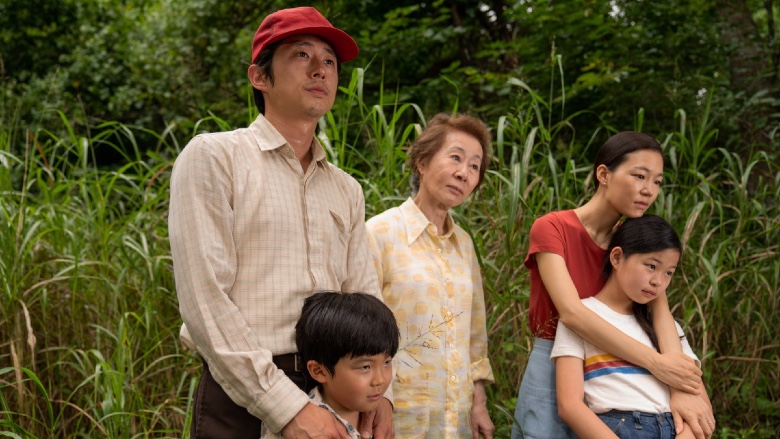
Minari is a reflection and a semi-autobiographical take on the life and upbringing of writer and director Lee Isaac Chung growing up in rural Midwest America as a South Korean immigrant in the 1980s.
Minari tells the story of a Korean family — Jacob (Steven Yeun), Monica (Han Ye-ri), son David (Alan Kim), daughter Anne (Noel Kate Cho) and legendary Korean actress Youn Yuh-Jung as grandmother Soonja — as they sacrifice everything to move to the States in search of opportunity and try to survive as immigrants in Arkansas speaking very little English and with hardly any money. David and Monica land a meager job at a baby chick factory known as “chicken-sexing,” which separates male and female baby chicks in pursuit of the ultimate goal of owning a farm due to the abundance of land. Chung found an instant connection and brotherhood through fellow Korean American Editor Harry Yoon (Shang-Chi and the Legend of the Ten Rings, Detroit), whom share a bond and similar life experience with immigrant parents moving to the U.S. for opportunity.
The film is a collection of memories that were edited together structurally within the storytelling realm. Yoon recalled, “From an editing standpoint, one of the interesting challenges of this film is that it’s elliptical in its structure and its storytelling because it’s a collection of memories. Isaac began the script by just writing down 50-60 memories that he had as a child. Even though there is kind of a plot and a storyline as it relates to the fate of the farm; a lot of moments, we aren’t sure how much time has passed between one moment and the next. The challenge was how do we shape the story and how do we shape the film in terms of its acts and arc to make sure those series of memories feel like each scene is a necessary part of the family story. It’s really about how these relationships evolve and change over the course of several seasons in the family’s life.”

The performances of the actors were one of the main driving forces in impacting the editing of the film. “I think what Isaac was able to capture in the casting and shooting; we maintained in the editing was just making these characters seem as familiar and as consistent to what the Korean American experience was like. In editing, we’re always trying to convey the truth about a particular character. Sometimes we have to approach it in a more literary intellectual way. What I really loved about this process was when we have performers like Steven and Yeri that can convey characters that feel so lived in. Often, we can remove chunks of dialogue because the way that they look and the way that they are in their essence make that dialogue feel redundant. Early on when he’s taking that break outside the chicken hatchery with his son, we had a page of dialogue where Jacob was talking about why the farm was so important for him. It went a little bit more into his backstory about how they used to have land in Korea, but they lost it, and how precious this opportunity was for him in terms of his family. But the way that Steven talks about the land so simply; the farm is great because we didn’t have one, we had nothing in California. Then he just pauses and looks off; we understand something really essential about Jacob, about why the land is so precious, without him having to say a word. We took advantage of featuring moments like that,” the editor defined.
Yoon continued, “As these tremendous actors are embodying their character to lift scenes where they’re explaining it on the page, that play well in the script, but are totally unnecessary once we get to the screen. We kept finding opportunities to do that for all of the performers. That’s a credit to how lived in their performances were. So much of crafting the performance was in plumbing our own personal experiences to make sure that what came through, rang true for an audience. They developed in Korean, what we would call “jeong” for one another; this affection, bond, and attachment. What we see on screen, particularly during the unscripted moments in the montage that we featured where they’re starting to farm and starting to explore the landscape around them. That affection is something that developed off screen and that we were able to just feature in the cutting room. It was there and was very evident in the performances.”
The film reflects multiple perspectives and point of views coming from different members of the family. “That’s one of the things that struck me about Isaac’s script from the start, which was that normally in a coming-of-age story, we focus almost exclusively on the experience of David, the young boy who’s featured in much of the movie. I think he wanted to make sure that the subjective experience and the concerns of the parents were front and center as well. That dialogue between subjectivities is what makes the film feel more like a balanced family film, where no one takes precedence over another. Since it was written by Isaac, the primary perspective comes from David. Trying to achieve that balance was something very important that we wanted to do as we selected the scenes and shaped the sequences in the movie. What I mean by selecting the scenes is we cut over 30 scenes, large and small, and took big chunks out of the existing scenes as well. It was a process of winnowing the things that were good and additive, but not necessarily essential to the telling the experience of the family that we wanted to tell. What was great was in starting to pull some of that stuff, even if it was really good; we created room and space for people to enter into the story. When certain characters weren’t there or missing or we weren’t lingering in particular moments, that it drew us in to say I wish I saw more of this. Even the ending is a really good example. We don’t necessarily know at the very end, what happened to Youn Yuh-Jung’s character, the grandmother. Even though she’s not physically there, her presence is there because of the field of minari that she planted. It was in trying to find that perfect balance of how much do you show, how much do you focus on a particular character, what happens when you start to take away certain scenes, and how much it makes everything else feel that much more essential. That was what governed our editing process,” the editor examined.
The editing helped construct the dramatic tension within the film. “Because the script is so elliptical, it’s hard to create a narrative or plot line through it. In the initial cuts, it wasn’t clear what the problem of the farm was because it’s a complex problem. He finds water in the land, but the water starts to dry up. Then he has to turn to paying for city water which ends up being way too expensive and gets the family into financial trouble increasing his stress. It was important through visual effects and editing to construct just enough of that story. That was one of the fun problems to solve in the editing room,” the editor said.

The pacing of the film invites us into reverie. Yoon enlightened, “Reverie is that state of being spellbound by a particular memory. We really wanted to create that sense of being unhurried in reflecting on our own child or our own family. There are certain scenes where it’s not cutty at all; really holding for a long time on the scene where they’re unpacking luggage. The interactions between Yeri Han and Youn Yuh-Jung at that point are so lovely and specific. The way that Lachlan Milne and Isaac framed that shot is so beautiful. It’s done through this doorway, so we have this voyeuristic pleasure in seeing this mother and daughter interact and learn about the things that are precious for an immigrant. Then we realize that was the POV of David all along when he’s revealed in the doorway. In certain times, just lingering when the frame is beautiful, and there’s lovely things happening in frame. At other times, during the more fervent prayer and anointing the house with the oil scene that Paul does later on in the film in which events are happening that are stressing the family out. This experience is unfamiliar and scary to somebody like David, who’s never seen someone praying, anointing a house, and casting out demons. The cutting of that feels a little bit more jump cutty or documentary style to convey the subjectivity of that experience. We use different techniques at different points of the film. Overall, it was this desire to convey the memory that Isaac has through David of his life, but also to evoke that same sense of reverie, that same sense of remembering in the audience.”
Some comedic moments were seamlessly integrated into the dramatic scenes. “For the comedic stuff, it was letting these naturally funny interactions between Alan and Youn Yuh-Jung play out. Naturally, they were very funny together. One of my favorite scenes is when she’s just watching him peel a banana and wrap a piece of cheese around it. He’s so focused on the task and she’s just patiently, instinctually waiting by and making these little comments. Just letting those moments play out organically. Same goes for the way that they’re interacting in their walk or when they’re at the minari patch, that there’s these really wonderful moments of bonding and interaction that the characters are going through. Just making sure that connection is clear between the two of them. That lends itself to a natural comedy of how these two people were relating to each other,” the editor described.
The fire near the end of the film highlights both burning on the outside and the inside struggle. Yoon revealed, “On the outside, it was in being restrained and not over featuring it. We had so many gorgeous shots of that fire and the barn burning down. It was doing just enough and no more to get to the moment and not linger or indulge in it. On the interior because of safety reasons and time, we had some limited coverage for the moment where Monica gets lost in the smoke and is overcome in the fire. It was trying to use every bit of those dailies to communicate that sense of crisis and confusion as she and Jacob are trying to save what’s left of the vegetables. Ultimately, Jacob makes the right choice. It was different challenges at different times. The fact that they made the right decision to actually burn down the barn, there was some consideration of using CG fire at a certain point. It really brings that shot and that moment exactly what we need cinematically to happen at that point in the story.”
The film resonates with the editor on a personal level. The editor associated, “My favorite scene in the film is the unpacking scene because I felt like it’s such a microcosm of what makes the film so resonate with me personally and invites the audience into an experience. Every item that the grandmother takes out of her suitcase just evokes these little explosions of memory for anybody who’s Korean American. The smell of the red pepper powder and the smell of anchovies, we know exactly what’s coming out. That tells us how much a small innocuous moment like that can be such an explosion of memory and such a touchstone for people who’ve lived it. Seeing that portrayed on screen and seeing audiences resonate with it even if they’re not Korean American or if they’re not immigrants; it resonates because of the specificity of it and the humor of it is one of the most precious things about working on this film.”
“It just reminds us what life was like for that first generation and how they lived. That’s one of the things I truly appreciate about Isaac’s script, it’s not just a second-generation story; we really feel the fears and hopes in a very subjective way of what Monica and Jacob are going through. That’s very rare to see in immigrant stories. This was one of the most precious and rewarding projects that I’ve ever worked on.”
The editing in Minari provides a sense of authentic, genuine profound connection and relatability for audiences of all nationalities. Minari is a prize winner from more than 50 film festivals, and it also has received nominations from the Golden Globes, Screen Actors Guild (SAG), and the Film Independent Spirit Awards. Editor Harry Yoon holds a nomination for the 2021 Satellite Award in Best Film Editing.
All photos courtesy A24 except where noted.





